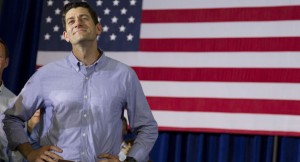The Essential Report Archive Read the latest report
-
15 October 2012, 151012, Barack Obama, Mitt Romney, preferred president, upcoming election, US election 2012
Prefer as US President
Q. Who would you prefer to see win the upcoming Presidential election in the United States?
Total
Vote Labor
Vote Lib/Nat
Vote Greens
Barack Obama 63%
78%
53%
85%
Mitt Romney 9%
2%
18%
1%
No difference 17%
13%
17%
3%
Don’t know 11%
7%
13%
11%
63% said they would prefer to see Barack Obama win the US Presidential election, 9% favour Mitt Romney and 17% think there is no difference.
All demographic and voter groups strongly favour Barack Obama.
-
Barack Obama, Mitt Romney, Paul Ryan, US elections
Sifting Through The Chaff on Ryan
What do you really need to know about Paul Ryan?
He’s more conservative on voting than Dick Cheney, if you can believe it (Cheney served in the House of Representatives). But, unlike the dour Darth Vader-image Cheney projected, Ryan is quite good on TV. He is not foaming at the mouth visually, so he actually can communicate to others.
 But, like all ideologues projecting certainty, there is more contradiction than consistency. On the one hand, his rhetoric and plan are profoundly anti-government:
But, like all ideologues projecting certainty, there is more contradiction than consistency. On the one hand, his rhetoric and plan are profoundly anti-government:It’s a profoundly radical document, its proposals skewed by ideological biases. Raising taxes, of course, is out of bounds. The same goes for using federal power to hold down Medicare costs, which will be the key driver of future budget deficits. Instead, House Republicans would cut spending on almost everything else the government does. According to an analysis by the Congressional Budget Office, the Ryan plan would, by 2050, reduce federal spending to its lowest point, as a percentage of G.D.P., since 1951.
But, hah, his actions are quite different:
Ryan voted for the $700 billion bank bailout, the biggest Medicare expansion in U.S. history, a massive highway bill that included the “Bridge to Nowhere” and other big-ticket priorities when George W. Bush was president — going to bat for a high-spending GOP agenda that the tea party base now looks on with regret.
On the politics, even if Republicans lose the presidential race, Ryan becomes a heir to the throne—the mantle of the leadership of the Republican leadership heading into 2016 White House race. Since he can also, under Ohio law, run for his Congress seat at the same time, either way, he’ll have a base of power so it’s a no-risk strategy for him to team with a candidate (Romney) who is, today, a slight underdog. Leading American pollster Nate Silver says, in a very, very long analysis (for the truly political geeks) about Ryan’s future:
The fact that he is quite young, that the Republican Party lacks an obvious successor other than him, and that he commands the respect of both the party base and the party establishment, all work in his favor in terms of running for and winning future nominations. Whatever happens this year, he is likely to be a major part of the American political landscape for a long time to come.
The underdog status will become even more pronounced if the Democrats are successful at tying Romney-Ryan to cutting Medicare and Social Security. Recall, because Americans are not required to vote, the election is about winning a small slice of swing voters in a few key states. Romney’s electoral path to victory probably has to include Florida, where there is a huge senior vote. If the Democrats can hang future budget cuts—a hallmark of Ryan’s budget plan—to eviscerating Medicare and Social Security, Romney can kiss Florida good-bye and then his path to victory becomes even harder, perhaps impossible (actually, at that point, Obama will probably win in an electoral rout).
Of course, this is assuming all other things remain static (as in that the economy doesn’t collapse in the next 2 months) and, well, in politics, things rarely remain static.